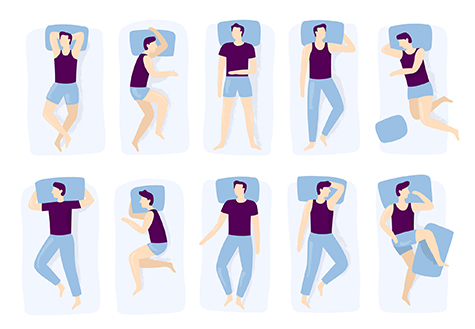Your Sleep Posture Helps Fight Brain Disease

Like most of us, when you go to sleep at night, you just want to hit the pillow and stay there until the alarm clock rings the next morning. But, there’s some new research that says how you sleep at night could lower your risk for getting certain brain diseases associated with getting older. Let me tell you about this 1 simple thing you can do to protect your future brain health.
Keep Your Brain Healthy: Change Your Sleep Position
How do you sleep at night? Even though I hope that you get a good night’s sleep, what I really mean is what position do you sleep in? Are you a back sleeper? A stomach sleeper? Or do you sleep on either of your sides?
In the past, not much was known about what the consequences of your sleep position was. It was generally thought that it was just important to get a good night’s sleep period, no matter what position you achieved it in.
But now, things have changed. Researchers out of Stony Brook University in New York have learned something amazing about why sleeping on your side may be more beneficial, especially as you get older.
You may not realize this, but when you go to sleep at night, your mind may be off in dreamland, but your physical body opens up its clean and repair shop. Sleep is a time when your body cleans itself of toxins incurred during the day. It’s also a time when it attempts to heal itself on the cellular level. Every major organ system, tissue, cell of your body undergoes a pretty miraculous transformation.
Sleep is when your body tries to heal any injury you may have from pulled muscles, wounds, broken bones, infections, etc. It also is a time when it just performs routine maintenance so that your DNA can continue to replicate normally. Other than just making you feel and look better the next day, physical healing is the real reason you need to get a good night’s sleep.
Your brain is a big part of that nightly repair system. During sleep, your brain actually bathes itself in fluids from both your lymphatic system and your cerebrospinal fluids. Doing this helps float away dangerous toxins that you were exposed to during the day. Research shows that Parkinson’s disease can develop from chronic exposure to toxins, both environmental and personal (smoking, using aerosolized chemicals, recreational drugs, alcohol, etc).
This brain bathing procedure also helps prevents the buildup of tau proteins that are associated with the development of Alzheimer’s and other degenerative neurologic diseases. Your other major organs go through a similar procedure using your lymphatic system to cleanse toxic wastes from them as well.
Until recently, though, it was unknown how much your sleep position facilitated your brain’s nightly cleaning process. But, using MRI (magnetic resonance imaging) scanning of the brain during sleep revealed how sleeping in the side position actually sped up and increased the brain bathing procedure.

The MRI documented the onset of when cerebrospinal fluid (CSF) started to filter through the brain and when it exchanged with the brain’s internal fluids (ISF). It was noted that in the side sleep position, the exchange filtration rates between these 2 types of fluids was greatest.
So, what about people who sleep on their back or stomachs? Are they doomed to develop neurologic disease in the future?
Well, interestingly, the side sleeping position has been documented to be the most common in both humans and animals. Perhaps this is a preference that Nature programmed into most of us to help keep our brain healthy. The rate and amount of brain fluid bathing that takes place, as seen on the Stony Brook MRI documentation, seems to point in this direction.
Perhaps more studies, correlating people who primarily slept on their backs or stomachs with the onset of brain disease, would add more information about how to lower your risk. The Stony Brook researchers hope that their findings may also add another treatment tool to those already diagnosed with Alzheimer’s, Parkinson’s, et al.
Training brain disease patients to sleep on their side may offer new hope. The researchers further back this idea with the fact that many cases of dementia are associated with sleep disturbances, including just falling asleep in general. Sleep disturbances have also been shown to speed up memory loss in already diagnosed Alzheimer patients.
What if preventing brain disease were as simple as sleeping on your side every night? Would you be willing to adopt a side sleep position if it meant lowering your risk of brain disease as you got older? I don’t know about you, but for me, changing my sleep position seems like a pretty small, simple thing I could do that could yield big brain health benefits.

